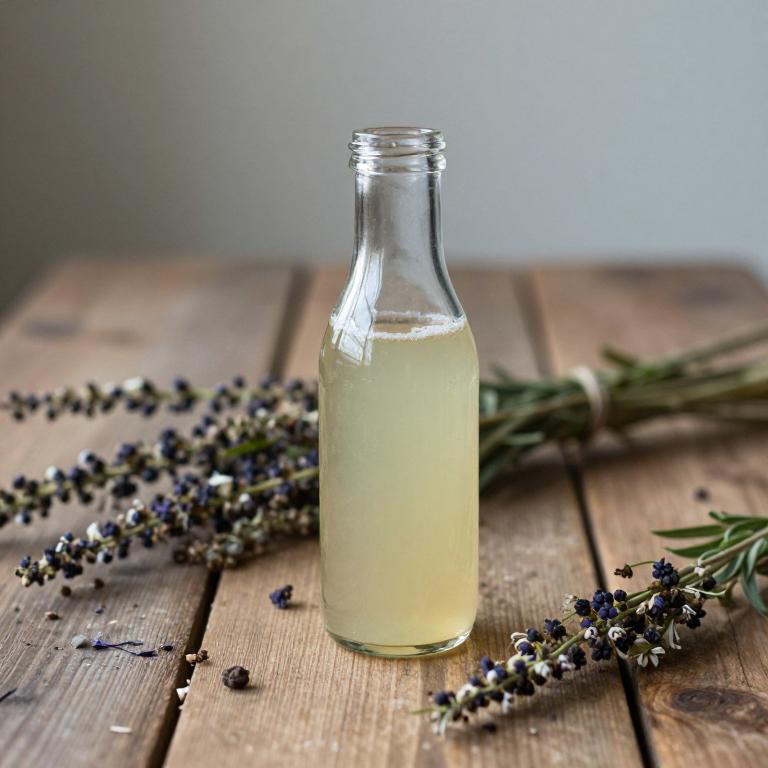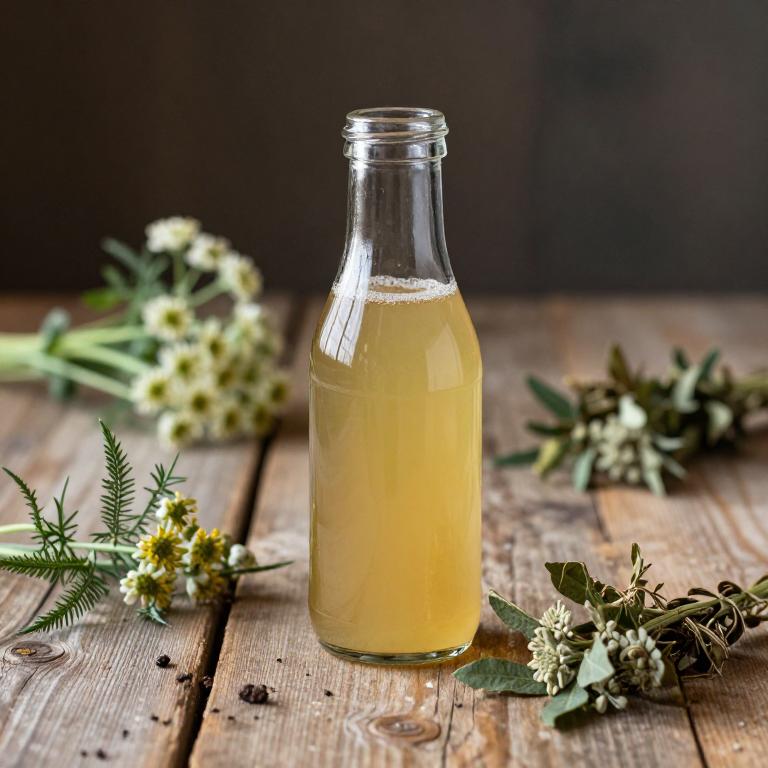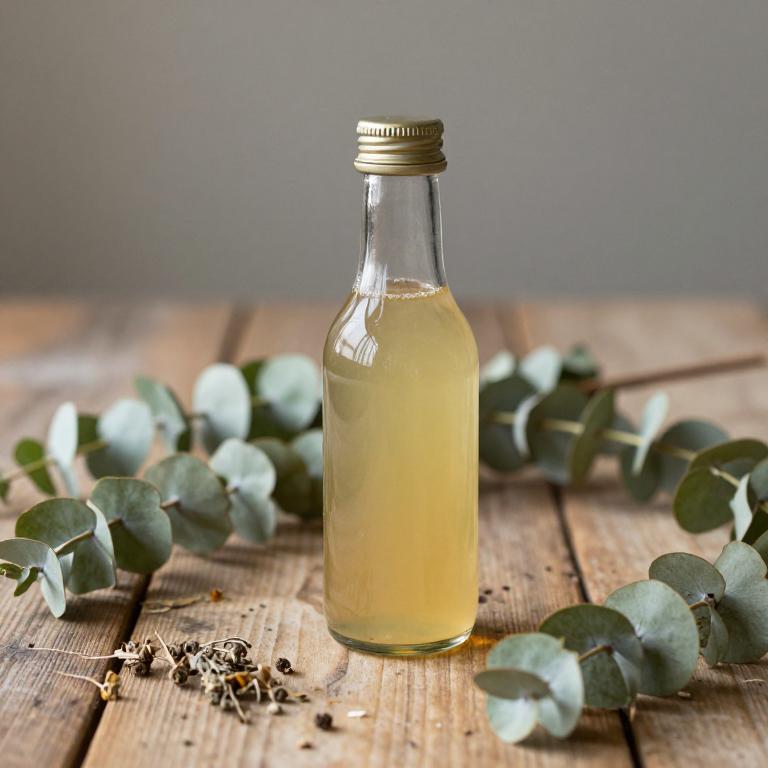10 Best Herbal Juices For Sinusitis

Herbal juices can be a natural and effective complement to conventional treatments for sinusitis, offering anti-inflammatory and antimicrobial properties that help reduce congestion and fight infection.
Commonly used herbs such as ginger, turmeric, and echinacea are known for their ability to support immune function and ease respiratory discomfort. Drinking fresh juices made from these herbs can help soothe irritated sinuses and promote drainage, providing relief from symptoms like nasal blockage and post-nasal drip. Additionally, herbal juices are often well-tolerated and can be easily incorporated into a daily wellness routine.
However, it's important to consult with a healthcare provider before using herbal remedies, especially for chronic or severe sinusitis.
Table of Contents
- 1. Stinging nettle (Urtica dioica)
- 2. Ginger (Zingiber officinale)
- 3. Thyme (Thymus vulgaris)
- 4. Catnip (Nepeta cataria)
- 5. Rosemary (Rosmarinus officinalis)
- 6. Yarrow (Achillea millefolium)
- 7. Salvia (Salvia officinalis)
- 8. Peppermint (Mentha piperita)
- 9. Parsley (Petroselinum crispum)
- 10. Eucalyptus (Eucalyptus globulus)
1. Stinging nettle (Urtica dioica)

Urtica dioica, commonly known as nettle, has been traditionally used for its potential anti-inflammatory and decongestant properties, making it a popular choice in herbal remedies for sinusitis.
Nettle juice is believed to help reduce nasal congestion and inflammation by supporting the body's natural detoxification processes and improving respiratory function. The high concentration of vitamins, minerals, and antioxidants in nettle juice may contribute to its effectiveness in alleviating sinusitis symptoms. However, it is important to consult with a healthcare professional before using nettle juice, as it may interact with certain medications or have side effects in some individuals.
Despite its traditional use, scientific research on the efficacy of urtica dioica juice for sinusitis remains limited, emphasizing the need for further studies to validate its therapeutic benefits.
2. Ginger (Zingiber officinale)

Zingiber officinale, commonly known as ginger, has been widely used in traditional medicine for its anti-inflammatory and antimicrobial properties.
When consumed as a herbal juice, ginger can help alleviate symptoms of sinusitis by reducing nasal congestion and inflammation in the sinus passages. The active compounds in ginger, such as gingerol and shogaol, are believed to stimulate mucus drainage and soothe irritated tissues in the respiratory tract. To prepare ginger juice for sinusitis, fresh ginger root is typically grated, juiced, and consumed either alone or mixed with honey or lemon.
Regular consumption of ginger juice may support immune function and provide natural relief for individuals suffering from chronic or recurring sinus infections.
3. Thyme (Thymus vulgaris)

Thymus vulgaris, commonly known as thyme, has been traditionally used in herbal medicine for its potent antiseptic and anti-inflammatory properties, making it a popular choice for supporting respiratory health.
When prepared as a herbal juice, thyme can help alleviate symptoms of sinusitis by reducing nasal congestion and soothing inflamed mucous membranes. The essential oils in thyme, particularly thymol, work to combat bacterial and viral infections that often contribute to sinus inflammation. To prepare thyme juice, fresh or dried thyme leaves are typically steeped in water or a carrier liquid and then strained for consumption.
While thyme juice may offer natural relief for sinusitis, it is advisable to consult a healthcare professional before use, especially for those with existing medical conditions or who are taking medications.
4. Catnip (Nepeta cataria)

Nepeta cataria, commonly known as catnip, has been traditionally used for its potential health benefits, including its effects on respiratory conditions like sinusitis.
While it is best known for its calming properties and use in herbal teas, some studies suggest that nepeta cataria may help reduce inflammation and ease nasal congestion associated with sinusitis. However, there is limited scientific evidence supporting the use of nepeta cataria in the form of herbal juices for treating sinusitis, and more research is needed to confirm its efficacy. When considering herbal remedies, it is important to consult with a healthcare professional to ensure safety and appropriateness for individual health conditions.
Despite its traditional use, nepeta cataria should not be viewed as a replacement for conventional medical treatments for sinusitis.
5. Rosemary (Rosmarinus officinalis)

Rosmarinus officinalis, commonly known as rosemary, has been traditionally used for its aromatic and medicinal properties, including its potential benefits for respiratory health.
Rosemary herbal juices, derived from the leaves of this evergreen shrub, are rich in antioxidants, anti-inflammatory compounds, and essential oils that may help alleviate symptoms of sinusitis. These juices can support natural drainage of the sinuses and reduce inflammation, making them a valuable complementary therapy. Some studies suggest that the active compounds in rosemary may help combat bacterial infections and ease congestion.
However, it is important to consult with a healthcare professional before using rosemary juices, especially for individuals with chronic sinus conditions or allergies.
6. Yarrow (Achillea millefolium)

Achillea millefolium, commonly known as yarrow, has been traditionally used for its anti-inflammatory and antiseptic properties, making it a potential natural remedy for sinusitis.
Herbal juices made from yarrow can help reduce nasal congestion and inflammation by supporting the body's immune response and promoting drainage of the sinuses. These juices may contain compounds such as flavonoids and volatile oils that contribute to their therapeutic effects. While more research is needed, some studies suggest that yarrow may help alleviate symptoms of chronic sinusitis when used as part of a holistic treatment plan.
However, it is important to consult with a healthcare professional before using yarrow juice, especially for individuals with allergies or those taking medications.
7. Salvia (Salvia officinalis)

Salvia officinalis, commonly known as sage, has been traditionally used for its medicinal properties, including its potential benefits for respiratory health.
Herbal juices made from sage may help alleviate symptoms of sinusitis due to their anti-inflammatory and antimicrobial properties. These juices can help reduce nasal congestion and inflammation by soothing the mucous membranes in the nasal passages. Some studies suggest that sage contains compounds that may inhibit the growth of bacteria commonly associated with sinus infections.
While more research is needed, incorporating sage herbal juice into a holistic treatment plan may offer natural support for managing sinusitis symptoms.
8. Peppermint (Mentha piperita)

Mentha piperita, commonly known as peppermint, is a popular herb used in the preparation of herbal juices for the relief of sinusitis symptoms.
These juices are valued for their natural decongestant and anti-inflammatory properties, which can help reduce nasal congestion and inflammation in the sinuses. Peppermint contains menthol, a compound that has a cooling effect and may help open up airways, making it easier to breathe. Regular consumption of peppermint herbal juice may support the body’s natural healing process and provide long-term relief from chronic sinus issues.
However, it is important to consult with a healthcare professional before incorporating peppermint juice into a treatment regimen, especially for individuals with existing health conditions or those taking medications.
9. Parsley (Petroselinum crispum)

Petroselinum crispum, commonly known as parsley, has been traditionally used for its potential benefits in treating sinusitis due to its antimicrobial and anti-inflammatory properties.
The essential oils found in parsley, particularly apiol and limonene, may help reduce nasal congestion and alleviate symptoms of sinus inflammation. Herbal juices made from fresh parsley leaves can be consumed internally to support respiratory health and promote natural drainage of the sinuses. Some studies suggest that parsley may help reduce the thickness of mucus, making it easier to expel, thus providing relief from sinus pressure and discomfort.
However, while parsley may offer supportive benefits, it is advisable to consult a healthcare professional before using it as a treatment for sinusitis, especially for individuals with existing health conditions or those taking medications.
10. Eucalyptus (Eucalyptus globulus)

Eucalyptus globulus, commonly known as the Australian eucalyptus, is often used in herbal juices to help alleviate symptoms of sinusitis due to its antimicrobial and anti-inflammatory properties.
These juices typically combine eucalyptus oil with other soothing herbs like ginger, turmeric, and licorice root to enhance their effectiveness. The aromatic compounds in eucalyptus can help clear nasal passages and reduce congestion, making it a popular natural remedy for sinus infections. However, it is important to consult a healthcare professional before using these juices, especially for individuals with allergies or chronic sinus issues.
While herbal juices may offer relief, they should not replace conventional medical treatments for severe or persistent sinusitis.